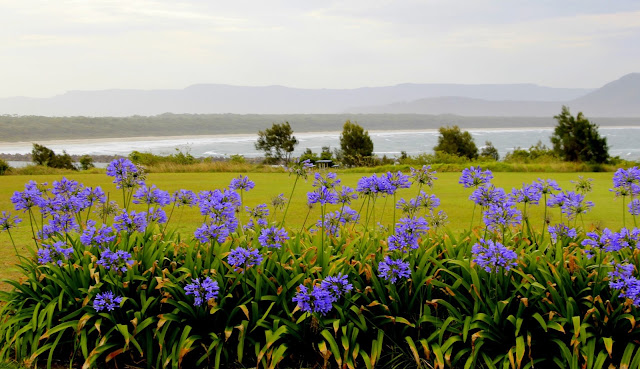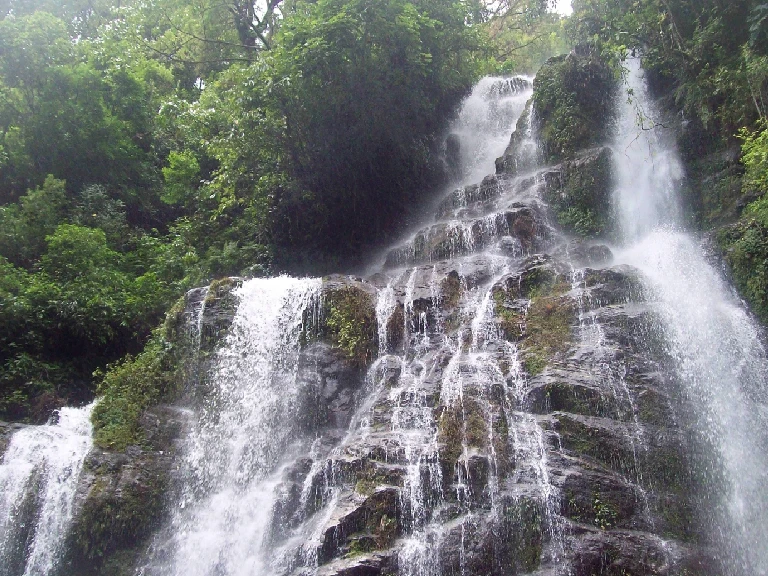A weekend in Shoalhaven – II
The next destination for the day was Culburra Beach – a sleepy yet rejuvenating hamlet, south east of Nowra, and just north of the Jervis Bay National Park. It is a quintessential watery paradise – to its north lies the Crookhaven River, to its south is Lake Woollumboola while its east is wrapped by the magnificent Pacific dotted with myriad sun and sea laden sandy stretches happily justifying the name of the place (Curbulla is aboriginal for sand)
We first headed to the Culburra Beach Motel located at the heart of the town. I met Gail who runs the place along with her husband Grant – Gail was a very cheery lady who happily talked to me about her hometown. In my opinion, this is one of the best parts of travelling – catching up with the local folks and hearing them talk with pride about their world, its unknown history and those hidden nooks and bejewelled corners that are well hidden from the Lonely Planets and the Tripadvisors of the world. Gail and Grant had bought this place about a year back and have since then been refurbishing and renovating this place to make for a wonderful and cosy stay in Culburra Beach. Gail showed me a wonderful drone video of Culburra and gave me one long list of to-dos, suddenly recharging my rest-and-relax weekend to a plethora of activities. I noted them down and decided to go-tick them all.
 |
| At Penguin Heads – you can spot the Lake Woollumbola near the horizon |
First, we headed to Penguin Head –named because the headland looks like a, guess what, penguin head! It is a brilliant vantage point on one end of the town that is apparently a home for the local fur seals. If you are really lucky, then you might even end up spotting those small fairy penguins. Well, my faunal luck was terribly bad, as I found neither
penguins, seals nor whales (they apparently spotted a mum and pup humpback a
week back even it was way past the whaling migration season). But I was
contented with the magnificent ceaseless views of the Pacific and the stretch
of Curbulla beach painted in gold on the left. On the right, you could see the
Lake Woollumboola faraway, opening onto the sea and the yellow sands swirling
and mixing in the confusion of sea and lake.
 |
| Vantage point @ Penguin Head – Curbulla beach lying like a thin golden ribbon |
There was the fleeting wind whistling in its solitude and thankfully no one else to compete for the views. Instances such as these bring up the poet and philosopher in you – emboldened by the comfort of Nature, you leave behind the triviality of your human past and start wondering the purpose for everything, until the rolling waves and wandering clouds happily remind you that the best way to deal with the inevitable is to just let it happen. Let time pass by, for it will, what remains is what you did in those fleeting moments.
 |
| Frozen! |
The cry of the yellow masked lapwings from afar brought me back to my world and I decided to keep on moving towards the other end of the town, towards the river Crookhaven. It is basically the same Shoalhaven river (that was breezily flowing by the Shoalhaven zoo) named differently and I must admit, a bit funnily as well. Very close to the estuary of the river lies the Crookhaven Heads Lighthouse, but I must admit that I was a bit let down with the same. Perhaps because the edifice looks quit dilapidated and run down, and perhaps because its glossier cousins (such as the ones I saw near Palm Beach, Jervis Bay and Watson’s Bay) look so much more nourished. A bit unexpected given that this country seems to willingly and proudly preserve every morsel of its history – set up in 1882 and then recommissioned in 1904 the Crookhaven Heads Lighthouse is not in any way less important, but somehow it seems badly in need for repairs. But that said, the little hike up to the head is spectacular – passing through undulating hills carpeted in greens and rambles, you pass through a strip of pebbly sands that is beautifully flanked by river on the left and sea on the right. It seemed like a fecund hotspot for anglers who were making the most of a beautifully lit up summer evening. There were plenty of pelicans on the river front, happily gliding the skies (and posing for my photos – a bit of wildlife always adds that extra zing to your photos, doesn’t it?)
 |
| Vantage point @ Penguin Head |
Once the Columbus in me had happily covered his newfound lands from tip to tip, I was happy to wander aimlessly wherever the road – or the river - led me. I happily followed the river upstream and found plenty of vantage points, originally for landing boats, but used for angling, and in my case, a bit of soul searching readily. Sunset on the waters always looks charming. There is no more outrage in the sun, and the world finally seems to be at peace with the citrus sky, and in the process with itself. The waters on the river seem to accept this unison of earth and sky by staying firmly rooted in the former while reflecting, and at times, exceeding the farewell crepuscular outburst of the latter. And a bit of ragged clouds work wonder – scattering the evening glows of melancholy and ushering in a bit of grandeur, somehow reassuring anyone who can believe that He is perhaps out there, watching, and painting signs of hope for any seeker out there.
 |
| A pod of pelicans roosting by the Crookhaven river |
The waters get doused in gold, with the shimmering waters happily giving away that it is but a lovely replica of the original firmament. The amity between earth and sky gets emphasized further with the winds at dusk, calming all those frayed nerves and reassuring that the worst is over. Yes, sunset on the waters is always an ethereal experience. It is refreshing each time, every time, happily rebooting your mind and writing a fresh essay etched from the finest energy of the world around you. How can Dusk then not make one philosophical, how can Dusk not be one’s best part of the day, I will always wonder. The farewell outburst of the sunset colours gradually gave way to the nascent twinkle of the rising stars. I was satiated just like the Dusk, and happily reminded myself – tomorrow would be a new day. With so much philosophy, how could I not etch some of my verses …..
It is when you listen beyond the silence of the heart,
Will you find a soulful song, gladly
playing its part
‘It’s beautiful,’ you say in tears, ‘what
makes you sound so true?’
The song replies, ‘Just that someone stops for once, a listener that is you.’
 |
| Evening at the Crookhaven river |
Day 2
The next day we headed
straight to Lake Woollumboola. The lake, from time to time, naturally opens up
to the ocean sitting right next door, becoming a lagoon and flushing its
nutrients to the sea. It is a hotspot for water birds, attracts heaps of
migratory birds and has been identified by BirdLife International (a global
forum aimed at conserving our feathered friends) as an Important Bird Area
(IBA) due to the large population of Black Swans that the Lake supports. I also
remember Gail talking about a team from National Geographic that was filming
the life of a rare endangered migratory bird – perhaps the red necked stints - on
this lake about a week back. These birds apparently migrate all the way from
the Arctic lands of Alaska and Siberia along the east Asian – Australasian flyway
to summer in these balmy climes of the lake.
 |
| Still waters of the Lake |
The lake was formed some
6000 – 8000 years back when the region was just a shallow valley. Rising sea
levels created a kind of sand barrier thus preventing the rain waters from
seeping into the seas. Over time, the rainwaters along with tidal infusions
from the sea accumulated to form this gigantic lake. In the driest continent on
the planet, every drop of fresh water counts – no wonder then that this was a
sacred spot for the local Jerringa Aboriginals. Having been around since the
last 40,000 years, I am sure they would have seen the lake being formed. I wish
I could read into their songs, passed from generation to the next that might
have mentioned this lake and its formation.
 |
| Lake Woollumbulla in all its expanse |
You might wonder why I
speak thus? Well, some of the Aboriginal songs from the North lands mention of
a thrashing lobster that led to rising seas, forcing the tribes to move further
inland – it was basically recounting rising sea levels after the end of the
last Ice Age 10,000 years back when the snow all around the polar caps were
melting quickly. It fascinates me to think of a primordial tribe which saw the
face of the earth changing and recorded it in their simple songs – no recorded
testimony of our race can be stronger evidence of our geological changes than
these hums of simplicity. Sadly a lot of the same has been lost and I am sceptical
how much of the remnants can be recovered.
My next – and last stop
for the day was to be some beautiful sea side creek for a quick dip in the Pacific.
Oh yes, another gift from Gail was the
Shoalhaven Guide book for 2017 – it also showcased the 100 beach challenge – 100
beaches in a shoreline spanning 200 kms. That’s roughly one lovely beach every 2
kms : well, this is Shoalhaven, what were you expecting? Spoilt for choices I finally
went to the Moona - Moona creek, a family sea-spot with a gentle creek merging
into the ocean. But yes, even the gentle creek with knee height waters had a
current strong enough to nearly trip me over a couple of times. With loads of
trees shading you from the summer sun, and carpets of greens everywhere, it was
a perfect beach side retreat. Summer, sunshine, sea, sands – and a bit of
seclusion – what more can you ask for? So much for the secrets of Shoalhaven!
Until next time…
 |
| Mooona Moona creek merging with the seas |
Fact
file:
- Distance – 180 km south of Sydney
- Travel Time – 3 hours
- Where to stay – plenty of options. We stayed at the Culburra beach motel and loved the ambiance
- What to do – well, listen to your heart and keep discovering on your Shoal-adventure :)





Very beautifully written, as usual :)
ReplyDelete"...until the rolling waves and wandering clouds happily remind you that the best way to deal with the inevitable is to just let it happen. Let time pass by, for it will, what remains is what you did in those fleeting moments" - Very true and very deep. Reminds me of Gulzar's "Aane wala pala, jaane wala hai. Ho sake to isme zindagi bita do, pal jo ye jaane wala hai"
what a comparison! :)
ReplyDelete